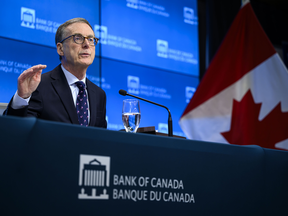Talks between the EU and India are expected to revive, which could bode well for Canada
Article content
The possible revival of trade talks between the European Union and India could be a positive signal for Canada, which, like Europe, has struggled to convince Asia’s third-biggest economy to embrace freer trade.
Various news outlets reported this week that officials from the EU and India were getting close to announcing the resumption of trade talks that have been on ice since 2013. An agreement between the two would be a major development, as it would unite the world’s richest economic bloc with a country that is on track to leapfrog China as the most populous nation on the planet before the end of the decade.
Canada knows a thing or two about stalled negotiations with India. The two countries initiated formal discussions in 2010, but after 10 rounds of talks over seven years had failed to produce a breakthrough, the effort lost momentum. Official negotiations were last held in New Delhi in August 2017, although the trade department says several “stocktaking meetings” have been held since, most recently in November.
Advertisement
This advertisement has not loaded yet, but your article continues below.
Article content

“Eleven years of frequent flier points is what we have to show for that,” said Rohinton Medhora, president of the Centre for International Governance Innovation, which, in 2018, joined with Gateway House, a Mumbai-based think-tank, to study ways that the Canada-India relationship could be strengthened.
Still, Medhora said he saw a glimmer of hope for Canada in the apparent shift in India’s willingness to engage with the EU. So did Stewart Beck, Canada’s former high commissioner to India from 2010 to 2014, who said a breakthrough between Europe and India would “augur well” for Canada’s prospects. Prime Minister Justin Trudeau pledged in 2018 to increase overseas exports by 50 per cent by 2025, and he’s directed his various trade ministers to put a particular emphasis on Asia, which has become the driver of much of the world’s economic growth.
Two conditions have changed since trade talks stalled between India and Canada. The first is shared anxieties over China’s newfound willingness to throw its weight around. Canadian tensions with China have heightened since Beijing arbitrarily jailed two Canadian citizens, Michael Kovrig and Michael Spavor. It was an apparent retaliation for the arrest in Vancouver of Chinese business executive Meng Wanzhou after Canadian authorities received an extradition request from the U.S. government in 2018. On the Indian side, fatal border skirmishes in the Himalayas last year have intensified the decades-long animosity between the two Asian nuclear powers, which fought a war in 1962.
Advertisement
This advertisement has not loaded yet, but your article continues below.
Article content
The second big change is a mutual desire to reconstruct economies that crumbled when tested by the COVID-19 pandemic. Both countries have signalled that they intend to reduce their dependence on supply chains that run through China by seeking out other sources for vital goods and services. In other words, stumbling blocks that loomed large a few years ago could be less daunting now, as national priorities have been rearranged by the crisis.

India has “already gone a long way down the road with the EU,” said Beck, who is now president of the Vancouver-based Asia Pacific Foundation of Canada. “They’ve gone a long way down the road with us. So rekindling the conversation and going back to the table isn’t a difficult exercise, and particularly if they demonstrate some degree of sincerity.”
Sincerity will indeed be a key factor to watch for both parties. India is the world’s largest market of vegetarians and Canada is its biggest supplier of plant-based protein. Yet Canada and other pulse exporters have faced steep tariffs on peas, lentils, and chickpeas since 2017 for no apparent reason other than India’s desire to protect local farmers from foreign competition. A trade agreement that levelled the playing field would help “incredibly,” said Mac Ross, the director of market access and trade policy at Pulse Canada.
Conversely, India “doesn’t take kindly” to the federal government’s tendency to play diaspora politics, currying to the large Punjabi-Canadian population, said Vivek Dehejia, a Carleton University economist with a specialty in international trade. For example, Justin Trudeau in December said he supported peaceful protest as Indian farmers took on tear gas and water cannons — a comment that irritated members of Prime Minister Narendra Modi’s government and summoned Nadir Patel, the current Canadian high commissioner, to the Indian foreign ministry for a reprimanding.
Advertisement
This advertisement has not loaded yet, but your article continues below.
Article content
“India, as a sovereign state, doesn’t take kindly to anyone sort of appearing to comment on their internal affairs,” Dehejia said “There’s a certain prickliness and sensitivity” that’s justified, he said.

The South Asian country’s invitation to participate in the G7 summit this year offers a chance for Canada to improve relations. Foreign Affairs Minister Marc Garneau said Wednesday that he had a “very successful” exchange with his Indian counterpart on the sidelines of a meeting of G7 foreign affairs ministers in London. Garneau said he and Subrahmanyam Jaishankar talked about increasing trade between their two countries, but declined to provide further details.
Politicians perennially describe Canada and India as natural trading partners, a notion that has yet to show up in the data. Canada’s trade imbalance with India has widened since the start of the pandemic. In April, the deficit grew by just over half from March to $185.9 million. Statistics Canada’s latest data show that in 2020, trade with India amounted to less than one per cent of Canada’s total. Most of what Canada sends to the South Asian country consist of metal ores and non-metallic minerals, followed by agricultural products such as lentils and chickpeas and energy products like coal.

If Canada and India do return the negotiating table, Canada would be seeking a “21st century trade agreement” that goes beyond mere tariff reduction schedules, though it will aim to overcome India’s high tariff walls, Beck said. He added that it’s important that Canada secures favourable agreement on services and intellectual property. Factoring those two aspects into free trade agreements would bolster the government’s push to harness the country’s intangible assets to drive economic growth.
Advertisement
This advertisement has not loaded yet, but your article continues below.
Article content
Meanwhile, Medhora sees huge potential in Canada’s green energy and investment sectors to enter India, pointing out that Canadian pension funds are already present there and contribute to infrastructure development.
Though he’s hopeful about positive talks, the former high commissioner recognizes it could be “a big challenge” for Indian negotiators to approach a more complex deal because the country, which under Modi stalled numerous trade pursuits, hasn’t completed many of those types of deals. “Whether we’d put a little water in our wine,” Beck said, in order to secure an agreement, “that’s the question.”

China halts economic dialogue with Australia in new retaliation

New threats to an old problem: The pandemic has made ‘brain drain’ even worse

Businesses are sitting on record $130B in excess cash, but will they invest it coming out of the pandemic?
However, optimism around India’s revitalized trade pursuits isn’t universal. Dehejia is skeptical that an EU-India deal would come about, as the bloc went through 14 rounds of negotiation before talks collapsed. He believes a similar situation could occur in Canada but he’s not so certain India would even bother entertaining talks with Canada as the populous country is focused on scratching out agreements with bigger economic players, like the U.S. and U.K.
“Canada is not as important to them,” Dehejia said. “If you talk to the people who are in the foreign policy establishment in India, they really want to be at the big table, play in the big leagues.”
If the EU and India do begin negotiating, and if those talks do fizzle, Medhora said that could, however, provide all the more impetus for India to pursue a deal with “a smaller player” as it seeks to stake out some of China’s dominance.
“It may be in India’s best interest to demonstrate that it can still do business with a western country,” he said.
• Email: bbharti@postmedia.com | Twitter: biancabharti
Advertisement
This advertisement has not loaded yet, but your article continues below.
Canada has bungled trade deals with India in the past. Could COVID and China finally unite the two?
2021-05-07 15:00:54





